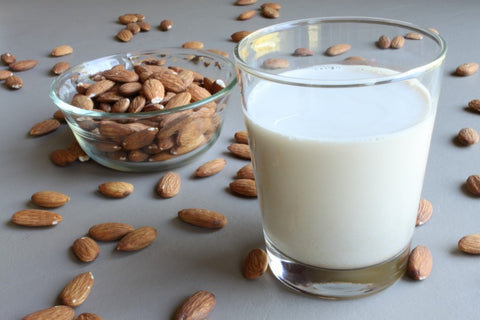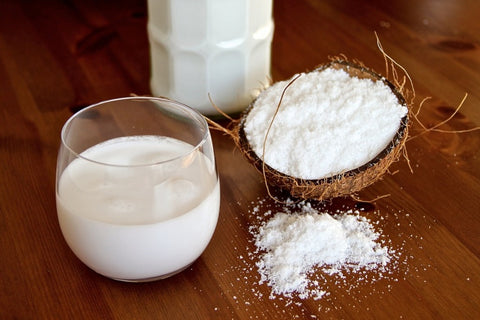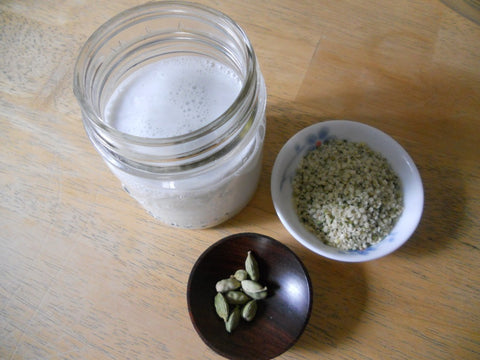Whether you are lactose intolerant, have philosophical or spirituality-based dietary restrictions or you just can't stand the taste of cow's milk, there are still a number of cow's milk alternatives that are both delicious and affordable. Not only do they make great milk substitutes as far as taste is concerned, they also bring some health benefits that you might not get from ordinary cow's milk.
1. Almond milk

Made from crushed almonds, almond milk packs quite a nice dose of protein in each creamy drop. Just like with other nut 'milk' solutions, the key thing you need to focus on is how emulsified the 'milk' stays. The more natural the almond milk, the easier it is for its components to separate. This doesn't just make the liquid look bad and unappetising but also sets back the taste. Still, there isn't really that big of a difference between almond milk brands that separate easily from more emulsified (and chemically-processed) brands when it comes to taste. With all things being equal, you might want to consider almond milk made from organic almonds with very little chemical processing.
2. Soy milk
Soy has been used in China for thousands of years as both a meat replacement and as a milk alternative. If you're looking for a milk replacement candidate with a solid pedigree, you can't go wrong with soy. Soy has a creamy silky taste that is very versatile. There are so many soy milk products in the market with all sorts of flavor variations. If you are looking for nutty soy milk, there are products accented with roasted sesame. There are also unsweetened and organic versions. One note of caution regarding soy-based products, there are studies that indicate that soy products can have a negative impact on humans' hormone levels. This shouldn't concern you if you drink soy milk only a few times every week. However, if you plan to drink soy milk daily, it would be a good idea to rotate between soy and other milk replacements like almond and flax seed among others.
3. Rice milk
Rice milk is essentially roasted and milled rice mixed with water. While not as naturally 'creamy' as coconut or nut-based milks, don't let this fact hold you back. Prepared properly, rice milk can make for a cool refreshing alternative to cow's or goat's milk. Not only do you avoid loading up on cholesterol and the bad kinds of fat, rice milk also lets you load up on B vitamins. If properly enriched, rice milk can give regular milk a run for its money. Keep in mind that rice milk can spoil easily so make sure you pick a brand that has the right balance between low chemical processing and organic ingredients and shelf life. Thankfully, many rice milk brands in the market do a decent job of walking this fine line.
4. Coconut milk
Back in the 1980s there were all sorts of scary health rumors and gossip spread about the 'evils' of coconut-based products. Coconut milk, in particular, was dragged through the wringer of public opinion. Not surprisingly, the global demand for coconut oil crashed. Thankfully, this period of hysteria is well past us. More and more research studies are pointing to the great health benefits of coconut oil and the product used to create it-coconut milk. For example, lauric acid, a key compound in coconuts have been shown to have very positive health benefits. Slowly, but surely, coconut products are beginning to regain their past popularity in the market.

If you are thinking of using coconut milk as a milk alternative, take note that there are two types of coconut milk: light and regular. If you want a less creamy or foamy milk, go with the light version. Coconut milk makes for a great drink if properly chilled and light enough. Regular milk formulations can have a heavy 'coconutty' taste that turns off some people.
5. Flax seed milk
Flax seed meal is the current darling of the global healthy food crowd-and for good reason. Flax meal comes packed with high levels of Omega fatty acids which have been linked to better heart health and brain function. Flax seed milk is nothing but water mixed with flax seed to produce an emulsion. If you are looking for a healthy milk replacement and like the taste of flax seed, this is a good choice for you.
6. Hemp milk
Considering all the progress made to date in legalising marijuana and marijuana-related products in the US, a discussion of hemp milk as a milk replacement would definitely be timely and appropriate. Hemp milk has some taste similarity to flax seed. While the quality of hemp milk can vary tremendously depending on the brands you sample, the key to a satisfying hemp milk experience is to keep experimenting until you find the formulation that fits you best.

Keep in mind, however, that hemp seed, the key ingredient for hemp milk, doesn't contain enough chemicals that can make you high. There's no need to worry that drinking hemp milk for breakfast might earn you a trip to the pokey if you were pulled over on your drive to school or work. Thanks to the fast evolving market for healthy milk substitutes, you don't have to settle for bad-tasting or flat-tasting milk alternatives. In my own experience, I have found almond milk to be my favourite milk alternative because of the fresh taste and its additional nutritional benefits.




